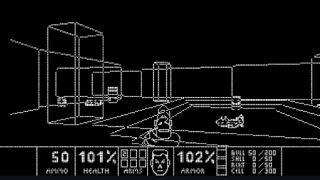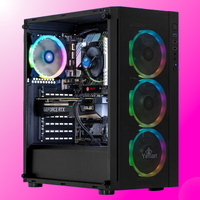Doom will run on a literal potato but apparently quantum computers still aren't powerful enough to run even this wireframe version natively
Quantum computing for gaming is a long way off it seems, so you're still better off playing it on your fridge/heart monitor/toothbrush.

Who would have thought that, all the way back in 1993 when it was first released, Doom would gain a second life as something of a hardware community project. Enterprising coders have repeatedly forced Doom to run on the most unlikely of hardware configurations, including 100 pounds of moldy potatoes (I kid you not), entirely within a motherboard BIOS, on a WiFi-equipped toothbrush, and even just completely generated by AI.
As for quantum computers, however? Well, while GitHub user Lumorti has created Quandoom, a recreation of the first level of the iconic shooter designed to run on the esoteric and highly experimental hardware, even they admit that a quantum computer does not yet exist that's powerful enough to run it. It is "effectively simulatable" on a laptop though, thanks to the QASM simulator.
Quandoom requires 70,000 qubits and 80 million gates to run. Currently, Atom Computing holds the record for the most powerful quantum computer, with 1,225 qubits. So, we're only looking at roughly 70x the qubits in order to enjoy ourselves a bit of Doom on a quantum machine then. No worries!
It's not even the full version of the game, either. Aside from being an adaptation of just the opening level, Quandoom also has some tasty bare wireframe graphics. Lumorti also says that there's no music or sound, enemies can't travel between rooms, and the imp fireball is now hitscan rather than a projectile, which sounds like the least of your worries if you're trying to get an ancient game running on more or less theoretical hardware.
Again though, like all of these attempts to force Doom to run on hardware that really wasn't designed for it, it's the sheer audacity of the project that makes it interesting. Shrinking Doom down and tweaking it to high heaven in order to force it to run on a conference attendee badge is one thing. But creating a version that runs on a quantum processor? I get a headache just thinking about how one works, never mind adapting a beloved game to run on it.
I'll just sample you a quote here from the GitHub description, just to give you an idea of what it takes to translate something like Doom into, for want of a better term, quantum computing form:
"For now I'm still tidying up the engine code, but basically I have about 8,000 lines of C++ functions allowing a number of reversible binary and arithmetic operations on quantum registers, for example "flipIfLessThanOrEqualTo" which flips all qubits in a register if the value of another register is less than some given value. Everything is done with integers. Using such functions I then wrote a small 3D engine as well as all the game logic.
The biggest gaming news, reviews and hardware deals
Keep up to date with the most important stories and the best deals, as picked by the PC Gamer team.
"Also present is an ancilla system, a garbage system, as well as a quantum subroutine system and many other handy tools...parallelisation is done at the rendering stage, such that the list of render objects is split between cores and comments are left in the QASM to tell the simulator where to jump based on OpenMP thread ID."
Yep, nope, that lost me as well. Damn my basic brain, I guess. Speaking of which, did you know a YouTuber is growing a rat brain and teaching it Doom? Chalk one up for rats, I guess. I struggle to get mine to run "grammar.exe" while listening to a podcast.
Best gaming PC: The top pre-built machines.
Best gaming laptop: Great devices for mobile gaming.

Andy built his first gaming PC at the tender age of 12, when IDE cables were a thing and high resolution wasn't. After spending over 15 years in the production industry overseeing a variety of live and recorded projects, he started writing his own PC hardware blog in the hope that people might send him things. And they did! Now working as a hardware writer for PC Gamer, Andy's been jumping around the world attending product launches and trade shows, all the while reviewing every bit of PC hardware he can get his hands on. You name it, if it's interesting hardware he'll write words about it, with opinions and everything.
Most Popular







